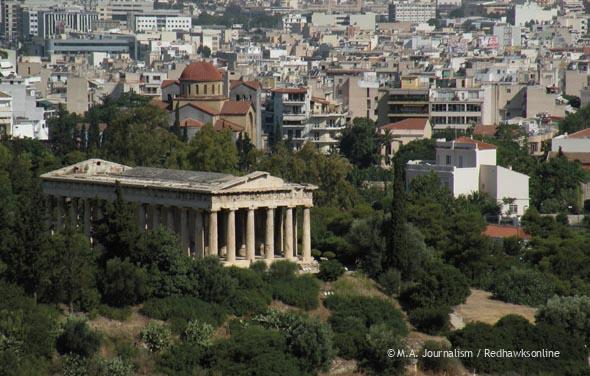Rioting crisis in the streets
Greek financial problems lead to a standstill with Minnehaha CFE hopes
Meara Cummings, Talon staff writer
“This is a critical time in Greece right now, and to be honest I am a bit nervous that we might have to alter our plans,” said Latin teacher and CFE trip leader Johanna Beck on February 13, as news reports showed rioting in the streets of Athens and turmoil in the financially burdened Greek government.
A group of Minnehaha students and leaders are scheduled to go to Greece in March for the Cultural Field Experience program (CFE) and the basic itinerary has been in the works for at least a year.
In Athens, protests have turned violent with firebombs from protesters answered with tear-gas from police. Several buildings were set on fire and scores of protesters and police officers were injured in the clashes.
“It’s not that I am worried from a safety standpoint,” said Beck. “We can avoid the areas of major conflict. It’s more that the Greeks will almost certainly call for mass union strikes, leaving archaeological sites, museums, and public transportation inaccessible to us.”
No changes to the trip have been made yet, but as dramatic headlines from Greece show, the economic situation there has come to a head. The country can’t pay the debt they owe to their creditors and have recently been forced to come to an agreement on a bailout plan with harsh austerity measures to avoid defaulting on their loans and getting kicked out of the Euro-zone. Austerity is a policy of deficit-cutting, lowering government spending and reducing the amount of benefits and public services provided to the people. This agreement will bring about some serious changes to the Greek economy, as well as some possible changes to the CFE trip.
The austerity measures in the bailout plan include lowering the minimum wage and cutting 150,000 jobs from the government payroll of 800,000 by the end of 2015.
“The Greeks are not going to be happy with that,” said Beck. “They think, ‘why should the everyday Greek have to tighten their belt if their government couldn’t manage it in the first place?'”
The Greek people have already been protesting the waves of austerity measures their government has taken with banners that read, “We will not pay their taxes, their debts.”
“[The Greeks are] a fiercely democratic people and they protest and want their voice to be heard,” said Beck. “Usually [the protests] are very organized and civil and they take turns, different groups will protest at different times. But for something this catastrophic I would guess that we’ll see the healthcare workers, the transportation workers, and the government workers all striking at the same time which for us [as travelers] would be bad because we won’t be able to get anywhere or do anything once we’re stuck.”
But how did Greece get to this point in the first place?
Like many countries, the Greek government has borrowed money from banks and other governments to pay for services that they otherwise wouldn’t be able to afford from their own tax revenue. These services include generous salaries for government workers, a strong social safety net, free or heavily subsidized tuition for universities and many other programs. The Greek people have grown accustomed to these benefits but national economic output is weak and many people simply don’t pay their taxes, forcing the government to raise taxes on the honest people that do. This mass tax evasion along with high government spending has created the simple problem that the government spends more than it takes in. This has resulted in a crippling debt total of over half a trillion dollars, almost 160 percent of their Gross Domestic Product (GDP).
“I think [the austerity plan] is definitely necessary,” said economics teacher and co-chaperone of CFE Greece trip, David Hoffner. “There’s always a good and bad and there’s always going to be winners and losers with every decision. This is good for their economy as a whole, because it will cause them to grow.”
Because many Greek citizens blame their leaders for the current financial situation, they are reluctant to accept austerity measures that would help to improve the situation. However, this underplays the responsibility of the people who elected these leaders in the first place. This can serve as an example for democratic voters everywhere of the possible consequences of electing leaders that cannot properly manage government spending or the people’s expectations. In fact, there are many parallels to our own financial situation in the United States, except for the fact that our economy is much larger and is able to avoid a similar fate for the time being.
It is still unclear whether or not the Greek bailout plan will even be implemented, or if implemented whether it will be successful in saving the Greek economy. This leaves a cloud of uncertainty over the future of the country as well as the Minnehaha CFE trip.
“There is something to be said for having the opportunity to be witnesses to such a major world event,” added Beck, “but the spirit of the trip will definitely be changed if the situation doesn’t calm down significantly.”

